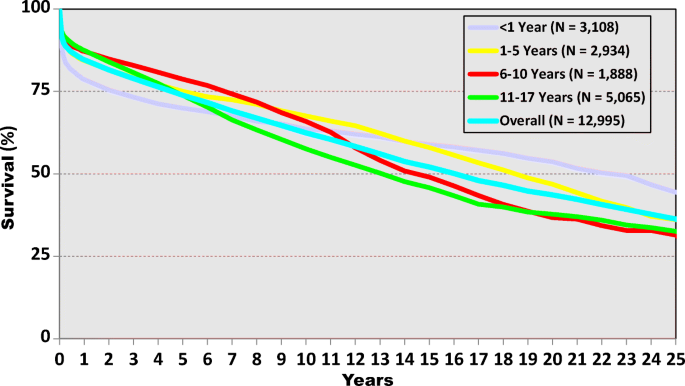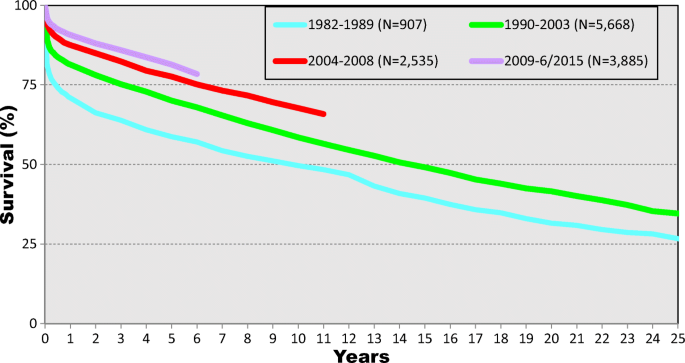Why is this study important. About 95 of the patients who had the transplant have a.
 Pediatric Heart Transplantation Long Term Outcomes Springerlink
Pediatric Heart Transplantation Long Term Outcomes Springerlink
Infants who survive the first couple of weeks of their procedure tend to live beyond 5 years without any complications.

Infant heart transplant life expectancy. There are cases where. Recipient age. Its encouraging because many kids are living longer lives that they wouldnt have been able to enjoy in the past.
Firm beliefs of the doctor that the patient can lead a better quality life post the transplant. Of those who survive the first year half are alive 135 years after a transplant. Other contraindications Heart transplantation is considered as a last resort for patients with end-stage heart disease who have no other surgical or medical therapies available.
Infant heart transplant life expectancy depends on how quickly the infant receives a heart. Rejection is the main cause for a shortened life span. Forty years ago children with single ventricle heart defects didnt survive past infancy.
Infant Heart Transplant Life Expectancy topic. In general though statistics show that among all people who have a heart transplant half are alive 11 years after transplant surgery. However we still dont know the expected life span for these patients.
If this happens within the first few weeks of life the life expectancy is fairly high. Well as per the survey over 313 patients in the past three years the results declare that 80 of the patients live for a minimum of five years after Heart Transplantation while 65 of patients have a survival period of above ten years. Hello we provide concise yet detailed articles on Hear Choices.
When you find the article helpful feel free to share it with your friends or colleagues. Generally people listed for heart transplantation have a life expectancy of less than one year. The information here is sourced well and enriched with great visual photo and video illustrations.
In general heart transplantation is considered in individuals with end stage heart failure with a life expectancy of less than 18 months where other medical therapy has been exhausted or ineffective. 28 2014 HealthDay News -- More than half of babies and children who receive heart transplants are surviving many years say the authors of a new study. What Happens After Heart Transplant Surgery.
If the patients survive for this time there is high chance about 90 to survive at least one year. Doctors agree that the first month 30 days after the surgery is crucial for the success of the transplant. Heart transplant is generally offered to patients who are under the age of 60 years.
There are now thousands of people in their 20s and 30s with Fontan circulation. One fourth of all heart-transplant patients in our series survived 20 years with the same graft and most enjoy independent lives despite significant comorbidities. The life of the patient is less than a year with his her current heart and a heart transplant is the only chance for hisher survival.
When a patient undergoes heart transplantation the first question that strikes his mind is what is Heart Transplant Life Expectancy. After heart transplant surgery your child be in the cardiac intensive care unit CICU. Because of advances in surgery medicine and intensive care capabilities today the majority survive.
The patient has no other disease that can reduce his lifespan except for a diseased heart. The average success rate is about 95 in most medical centers licensed for heart transplant surgeries. Risks of a Heart.
The critical period when it comes to infant heart transplant success rate is the period during the first few days after the procedure. Pediatric heart transplant patients are living 15 years and longer with good heart function the scientists said. Some babies born with a CCHD look healthy at first.
However the chance of these infants dying is still high. Statistics Of Life Expectancy. Someone on the transplant team will keep you informed about how the surgery is going while you wait.
The heart transplant life expectancy in children would vary as compared to adults. They can be sent home with their families before their heart defect is found. As the infants immune system develops the chances of a high infant heart transplant life expectancy reduce.
Life expectancy after a heart transplant is 85 the first year. The first recipient of an infant heart transplant is still alive and well but eventually about 1 in 2 children who receive a new organ will die from complications that happen from the procedure. Infants and children who undergo heart transplantation are experiencing good outcomes after surgery and may expect to live beyond 15 years post.
For infants with critical congenital heart defects CCHDs survival up to one year of life has improved over time. Survival rates for people whove had a heart transplant vary according to their overall health status but averages remain high. Getting regular follow-up care seeking prompt medical attention for any symptoms or other concerns and taking all medications exactly as prescribed can help decrease the risk of.
Most heart transplant surgeries last between 4 and 6 hours.